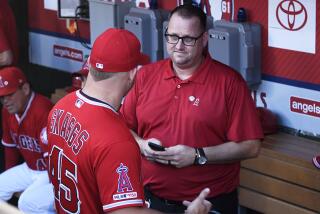Ex-Pitcher Blue Moon Odom Found Guilty of Selling Cocaine
- Share via
An Orange County Superior Court jury Thursday convicted former major league pitcher John (Blue Moon) Odom on two counts of selling small amounts of cocaine to a co-worker at an Irvine computer plant.
“I can’t believe a jury was picked that convicted me when there was no real evidence against me,” Odom said solemnly, a few minutes after the jury had returned the guilty verdict.
Although his wife, Gayle, sobbed when the verdict was announced, Odom--a former Oakland A’s pitcher who appeared in the 1972, ’73 and ’74 World Series--showed no emotion.
Superior Court Judge David H. Brickner set sentencing for Aug. 29. Odom, 41, could be sentenced to up to six years in prison. His attorney, Stephen A. DeSales, immediately filed a petition for probation. Odom, meanwhile, remains free on his own recognizance.
The jury had been deliberating since late Tuesday and had requested that major portions of testimony be read to them before Thursday morning’s final vote.
One juror said the panel initially was deadlocked, 6-6, on one of the counts against Odom, who was accused of twice selling $100 worth of cocaine to Willie Earl Harris. The two men worked at the now-defunct Xerox computer plant in Irvine.
According to the prosecution, the drug transactions occurred May 17 and May 24, 1985, in the plant’s parking lot. An Irvine undercover police officer testified that he saw the two exchanges. Odom claimed that he had not sold Harris cocaine during the first incident and that on the second occasion he was merely collecting a $100 debt.
DeSales also expressed surprise at the guilty verdict but said, “At least, Mr. Odom has put this portion behind him.”
Odom lost his job after his arrest 14 months ago and has been unable to find regular employment. He said that depression over the case and his inability to find a job contributed to an emotional breakdown last December, during which he attacked his wife.
Those charges were eventually settled when Odom agreed to undergo counseling. A few weeks ago, still unable to find a job, Odom became a house painter to earn a living.
During the trial, Odom said he had been unfairly accused and testified that, in fact, Harris had sold him cocaine and that he had never dealt drugs. DeSales also contended that Harris had accused Odom only to get preferential treatment from the district attorney on his own cocaine possession case.
Harris was arrested May 24, 1985, just after he allegedly had bought cocaine a second time from Odom. His case, however, is still pending, and the district attorney’s office has denied that Harris was promised leniency in return for his testimony against Odom.
“They have their conscience to live with,” DeSales said. “Mr. Odom and I can sleep at night.”
Deputy Dist. Atty. Gregg L. Prickett said he had expected the guilty verdict, noting: “I am very happy with the verdict. I think the jury took the task to heart.”
However, the prosecutor said he was disturbed that Odom’s case, which he described as small, had generated so much attention.
“I feel it’s an important commentary on our society today . . . when there are so many other serious cases such as rape and murder,” Prickett said.
Jurors said their decision had been difficult.
Linda Oprian, for example, said that although no cocaine had been found on Odom when he was arrested, she and other jurors believed Harris when he testified about buying cocaine twice from the former baseball player.
More to Read
Sign up for Essential California
The most important California stories and recommendations in your inbox every morning.
You may occasionally receive promotional content from the Los Angeles Times.










